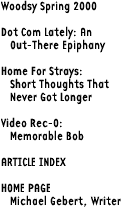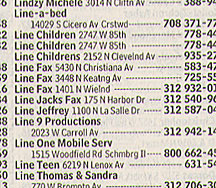

PROOF THAT YOU SHOULD NEVER assume that any system is completely idiot-proof: despite the fact that the people who enter the data for the phone book are presumably familiar with the concept of listing a second line as “Fax Line” or “Children’s Line” under the main listing, in the 1999 Chicago phone book under “L” you will find several listings as if there were people actually named “Line, Fax” or “Line, Childrens.”
fig. 1: 1999 Chicago phone book.

THERE'S A PIECE OF E-MAIL FLOTSAM going around that points out how different the worldview of today’s graduating seniors is from that of their elders—that they’ve never known a world with a Cold War or dial phones, or without computers and MTV, etc. Supposedly us thirtysomethings in advertising should quake at this vast cultural gulf. But I don’t see a shift nearly as large as that between, say, my mom’s semi-deprived WWII childhood and my own prosperous, ranch-style Space Age one. And no men in gray flannel suits suffered undue angst about how I never knew a world with ration books, or without Milton Berle. They just sold the hell out of their Sugar-Coated Frosted Gluco-Puffs.
GREAT MOMENTS IN TARGET MARKETING DEPT.: Mad magazine readers: 12-year-old iconoclasts, classroom rebels, who probably disproportionately grow up to be agency creatives. Macintosh users: 30-year-old iconoclasts, corporate rebels, who are disproportionately agency creatives. So Broderbund puts out a 7 CD-ROM set of every back issue of Mad... and makes it Windows only.
MY FREELANCING IDOL, Jim Morris, recently asked in his Screen magazine column why so few big agencies get “integration” (of TV brand advertising with direct mail/sales promotion/etc.) right. To me the answer is simple: because while all-that-is-not-TV may be extremely important to clients, they have not forced agencies to make it important to the paychecks and career paths of bigshot creative directors. (Indeed, they've positively indulged them in their TV fetish.) I suspect all this will change only when broadband Internet replaces the 30 second spot as the engine of an agency career (as TV did the double-truck print ad in the 50s), and the giants belatedly realize that this new form calls for both the TV man’s glitz and the direct guy’s sense of how to manage a relationship and close a sale in the same piece of creative. (Morris and I disagree, however, on when this is likely to happen: I say in 5 years, and he says in a pig's eye.)
Go to Video Rec-O